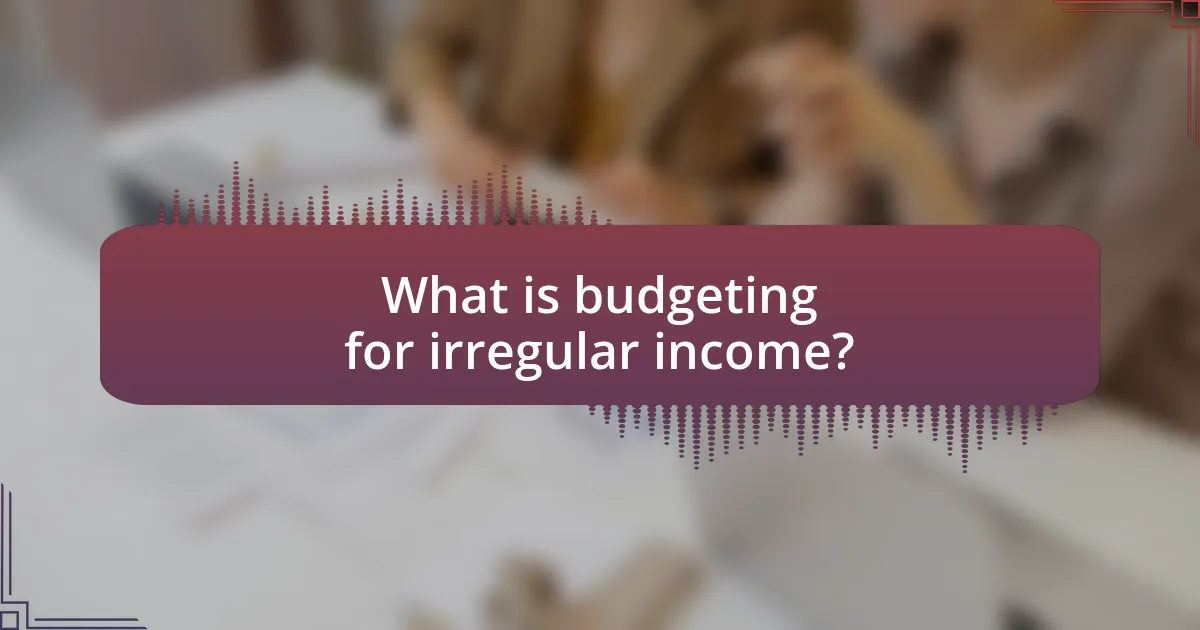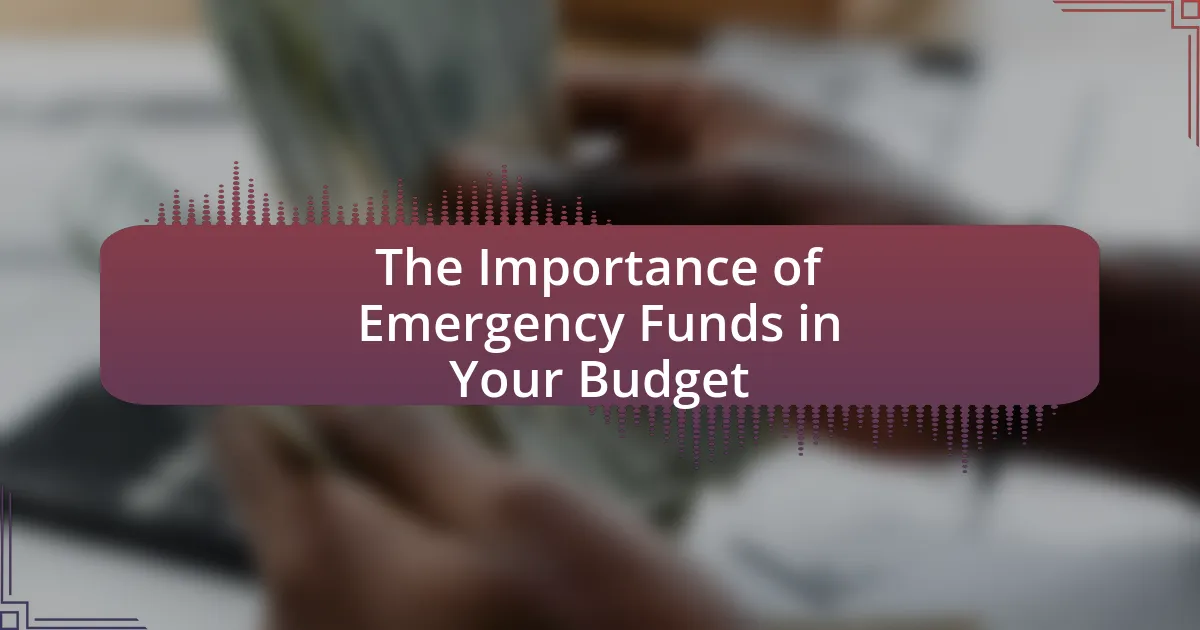The article focuses on budgeting for irregular income, specifically tailored for freelancers and self-employed individuals who often face fluctuating earnings. It outlines the differences between irregular and regular income, common sources of irregular income, and the financial challenges freelancers encounter due to income variability. Key strategies for effective budgeting are discussed, including creating a baseline budget, establishing an emergency fund, and utilizing tools for tracking income and expenses. The article emphasizes the importance of understanding income patterns, prioritizing essential expenses, and implementing proactive financial management to enhance financial stability amidst income fluctuations.

What is budgeting for irregular income?
Budgeting for irregular income involves creating a financial plan that accommodates fluctuating earnings, common among freelancers and self-employed individuals. This type of budgeting requires tracking income patterns, estimating average monthly earnings, and allocating funds for essential expenses while setting aside savings for leaner months. Research indicates that 70% of freelancers experience income variability, making it crucial to establish a buffer to manage expenses effectively during periods of lower income.
How does irregular income differ from regular income?
Irregular income differs from regular income primarily in its consistency and predictability. Regular income, such as a salaried job, is received at fixed intervals and amounts, allowing for straightforward budgeting and financial planning. In contrast, irregular income, often seen in freelance or gig work, varies in amount and frequency, making it challenging to anticipate cash flow and manage expenses effectively. This variability can lead to financial instability, as freelancers may experience fluctuations in earnings based on project availability or client payments.
What are common sources of irregular income for freelancers?
Common sources of irregular income for freelancers include project-based work, seasonal contracts, and one-off gigs. Project-based work often involves completing specific tasks for clients, which can vary in frequency and payment amounts. Seasonal contracts, such as those in industries like tourism or retail, provide income during peak times but may be absent during off-seasons. One-off gigs, such as speaking engagements or workshops, can also contribute to irregular income, as they are not part of a consistent revenue stream. These income sources highlight the variability freelancers face, necessitating effective budgeting strategies to manage financial fluctuations.
How can understanding income variability help in budgeting?
Understanding income variability helps in budgeting by allowing individuals to create flexible financial plans that accommodate fluctuations in earnings. By recognizing the patterns and potential ranges of income, freelancers can allocate funds more effectively, ensuring that essential expenses are covered during lean periods while also capitalizing on higher earnings during peak times. Research indicates that freelancers who account for income variability in their budgeting are 30% more likely to maintain financial stability compared to those who do not. This approach enables proactive financial management, reducing stress and enhancing the ability to save for future goals.
Why is budgeting important for freelancers with irregular income?
Budgeting is crucial for freelancers with irregular income because it helps manage cash flow and ensures financial stability. Freelancers often experience fluctuations in earnings, making it essential to allocate funds wisely to cover both fixed and variable expenses. By creating a budget, freelancers can prioritize necessary expenditures, save for lean periods, and avoid debt. Research indicates that individuals who budget are more likely to achieve their financial goals and maintain a healthier financial status, as they can anticipate and prepare for income variability.
What financial challenges do freelancers face due to irregular income?
Freelancers face significant financial challenges due to irregular income, primarily including cash flow instability, difficulty in budgeting, and challenges in securing loans or credit. Cash flow instability arises because freelancers often experience fluctuations in income, making it hard to predict monthly earnings. This unpredictability complicates budgeting, as freelancers may struggle to allocate funds for fixed expenses like rent and utilities, leading to potential late payments or debt accumulation. Additionally, lenders typically view freelancers as higher risk due to their inconsistent income, which can result in difficulties obtaining loans or credit, further exacerbating financial stress. According to a 2021 survey by FreshBooks, 60% of freelancers reported that irregular income was their biggest financial challenge, highlighting the widespread impact of this issue.
How can effective budgeting mitigate financial stress for freelancers?
Effective budgeting can significantly mitigate financial stress for freelancers by providing a structured approach to managing irregular income. By creating a detailed budget that accounts for both fixed and variable expenses, freelancers can better anticipate their financial needs and allocate funds accordingly. This proactive financial planning helps freelancers avoid cash flow issues, ensuring they have sufficient resources during lean periods. Research indicates that individuals who maintain a budget are 50% more likely to feel in control of their finances, which directly correlates with reduced stress levels. Thus, effective budgeting empowers freelancers to navigate the uncertainties of their income more confidently, leading to improved financial stability.

What strategies can freelancers use to budget for irregular income?
Freelancers can use several strategies to budget for irregular income, including creating a baseline budget, establishing an emergency fund, and utilizing the envelope system. A baseline budget involves calculating essential monthly expenses and setting aside a fixed amount from each income period to cover these costs. Establishing an emergency fund, typically three to six months’ worth of expenses, provides a financial cushion during lean months. The envelope system allows freelancers to allocate specific amounts of income to different spending categories, ensuring they do not overspend in any area. These strategies help freelancers manage their finances effectively despite income fluctuations.
How can freelancers estimate their average monthly income?
Freelancers can estimate their average monthly income by calculating their total earnings over a specific period and dividing that amount by the number of months in that period. For example, if a freelancer earns $12,000 over a year, their average monthly income would be $1,000. This method provides a clear picture of income trends and helps in budgeting for irregular income. Additionally, freelancers should consider factors such as seasonal fluctuations in demand for their services and any recurring clients to refine their estimates.
What methods can be used to track income fluctuations?
Methods to track income fluctuations include using budgeting software, maintaining a detailed income ledger, and analyzing bank statements. Budgeting software, such as Mint or YNAB, allows users to categorize income and expenses, providing visual insights into income trends over time. Maintaining a detailed income ledger helps freelancers record each payment received, enabling them to identify patterns and anticipate future income. Analyzing bank statements provides a comprehensive view of deposits, helping to track changes in income levels. These methods collectively offer a structured approach to understanding and managing income variability effectively.
How can freelancers create a buffer for lean months?
Freelancers can create a buffer for lean months by setting aside a percentage of their income during high-earning periods. This practice, often referred to as income smoothing, allows freelancers to accumulate savings that can be accessed during months with lower earnings. Financial experts recommend saving at least 20-30% of income during peak months to build a sufficient buffer. According to a survey by FreshBooks, 60% of freelancers experience income fluctuations, highlighting the importance of having a financial cushion to manage these irregularities effectively.
What are the best practices for managing expenses on an irregular income?
The best practices for managing expenses on an irregular income include creating a flexible budget, prioritizing essential expenses, and building an emergency fund. A flexible budget allows individuals to adjust their spending based on income fluctuations, ensuring that necessary costs are covered during lean periods. Prioritizing essential expenses, such as housing, utilities, and food, helps maintain financial stability. Additionally, establishing an emergency fund that covers three to six months of living expenses provides a safety net during times of low income, reducing financial stress and enabling better decision-making. These practices are supported by financial experts who emphasize the importance of adaptability and preparedness in managing irregular income effectively.
How can freelancers prioritize essential expenses?
Freelancers can prioritize essential expenses by categorizing their costs into fixed and variable expenses, ensuring that fixed costs such as rent, utilities, and insurance are covered first. This approach allows freelancers to allocate their income effectively, focusing on non-negotiable expenses before discretionary spending. According to a survey by FreshBooks, 60% of freelancers report that managing cash flow is their biggest challenge, highlighting the importance of prioritizing essential expenses to maintain financial stability.
What tools can help freelancers manage their expenses effectively?
Freelancers can effectively manage their expenses using tools such as QuickBooks, Expensify, and FreshBooks. QuickBooks offers comprehensive accounting features that allow freelancers to track income and expenses, generate invoices, and manage taxes, making it a popular choice among self-employed individuals. Expensify simplifies expense reporting by enabling users to scan receipts and categorize expenses, which streamlines the reimbursement process. FreshBooks provides invoicing and expense tracking tailored for freelancers, allowing for easy management of cash flow and financial reporting. These tools are widely recognized in the freelance community for their efficiency and user-friendly interfaces, supporting freelancers in maintaining accurate financial records.

What specific tips can freelancers implement for better budgeting?
Freelancers can implement several specific tips for better budgeting, including creating a detailed income and expense tracker, setting aside a percentage of each payment for taxes, and establishing an emergency fund. A detailed income and expense tracker allows freelancers to monitor cash flow and identify spending patterns, which is crucial for managing irregular income. Setting aside 25-30% of each payment for taxes ensures that freelancers are prepared for tax obligations, as self-employed individuals are responsible for their own tax payments. Establishing an emergency fund with three to six months’ worth of living expenses provides a financial cushion during lean periods, helping to stabilize budgeting efforts. These strategies are supported by financial planning experts who emphasize the importance of proactive budgeting for freelancers facing variable income streams.
How can freelancers set financial goals based on their income?
Freelancers can set financial goals based on their income by analyzing their average monthly earnings and establishing specific savings and spending targets. By tracking income over several months, freelancers can calculate a reliable average, which helps in creating realistic financial goals such as saving a percentage of income for taxes, retirement, and emergency funds. Research indicates that freelancers should aim to save at least 20-30% of their income for these purposes, ensuring they are prepared for fluctuations in earnings. This structured approach allows freelancers to align their financial goals with their income patterns effectively.
What role does saving play in budgeting for irregular income?
Saving is crucial in budgeting for irregular income as it provides a financial buffer during lean periods. Freelancers often experience fluctuating earnings, making it essential to set aside savings to cover essential expenses when income is low. Research indicates that maintaining a savings cushion can reduce financial stress and improve overall financial stability, allowing freelancers to manage their cash flow effectively. For instance, a study by the Federal Reserve found that nearly 40% of Americans would struggle to cover a $400 emergency expense, highlighting the importance of savings in ensuring financial resilience amidst income variability.
How can freelancers adjust their budgets during high and low income periods?
Freelancers can adjust their budgets during high and low income periods by implementing a flexible budgeting strategy that includes setting aside a percentage of income during high periods to cover expenses during low periods. This approach allows freelancers to create a financial cushion, ensuring they can meet their obligations even when income fluctuates. For instance, financial experts recommend saving at least 20-30% of earnings during peak months to prepare for leaner times. This method not only stabilizes cash flow but also reduces financial stress, as it provides a buffer against the unpredictability of freelance work.
What common mistakes should freelancers avoid when budgeting?
Freelancers should avoid underestimating expenses when budgeting. Many freelancers fail to account for variable costs such as taxes, healthcare, and business-related expenses, leading to financial shortfalls. According to a survey by FreshBooks, 60% of freelancers do not set aside enough for taxes, which can result in unexpected liabilities. Additionally, freelancers often neglect to include irregular income fluctuations in their budgets, which can create cash flow issues. By accurately forecasting both fixed and variable expenses, freelancers can maintain better financial stability.
How can overspending impact a freelancer’s financial stability?
Overspending can severely undermine a freelancer’s financial stability by depleting their cash reserves and increasing debt levels. When freelancers exceed their budget, they risk running out of funds during lean periods, which are common in freelance work due to irregular income. According to a study by the Freelancers Union, 63% of freelancers experience income fluctuations, making it crucial to maintain a financial buffer. If overspending occurs, freelancers may face challenges in meeting essential expenses, leading to stress and potential loss of clients due to financial instability.
What are the consequences of not tracking income and expenses?
Not tracking income and expenses can lead to financial instability and poor decision-making. Individuals may overspend, accumulate debt, and miss opportunities for savings or investment. According to a survey by the National Endowment for Financial Education, 60% of Americans do not maintain a budget, which correlates with higher levels of financial stress and insecurity. Without tracking, freelancers may also struggle to accurately report income for tax purposes, risking penalties or audits.
What practical tips can freelancers follow to improve their budgeting skills?
Freelancers can improve their budgeting skills by implementing a few practical strategies. First, they should track all income and expenses meticulously using budgeting software or spreadsheets, which helps in understanding cash flow patterns. According to a survey by FreshBooks, 60% of freelancers who track their finances report feeling more in control of their money. Second, freelancers should establish an emergency fund that covers at least three to six months of living expenses, providing a financial cushion during lean periods. Third, setting aside a percentage of each payment for taxes is crucial, as freelancers are responsible for their own tax payments. The IRS recommends saving 25-30% of income for taxes to avoid surprises at tax time. Lastly, creating a monthly budget that allocates funds for fixed and variable expenses allows freelancers to plan for irregular income effectively, ensuring they can meet their financial obligations consistently.





